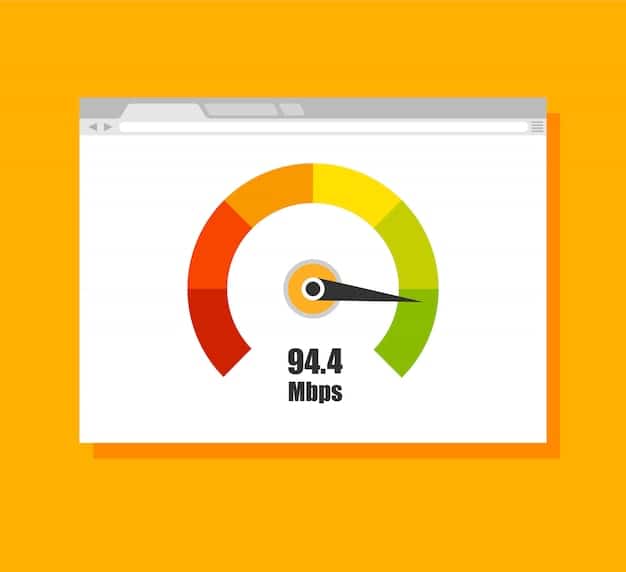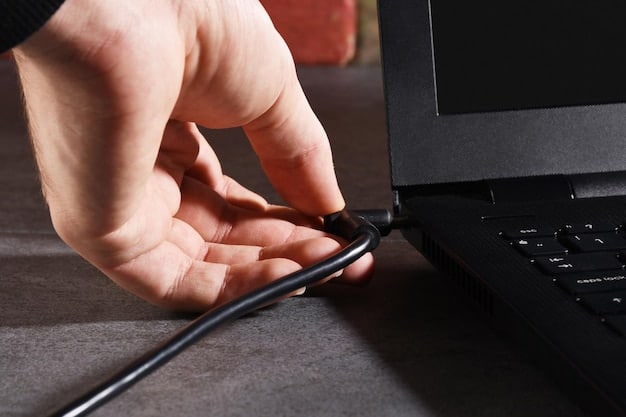PC Gaming: Stop Overpaying for Internet and Get the Best Latency Under $75

PC gamers often overpay for internet without realizing they can achieve optimal latency and performance by understanding their needs, exploring different internet plans, and optimizing their network settings, potentially saving money and enhancing their gaming experience.
Are you a PC gamer tired of lag spikes and high ping ruining your gameplay? You might be overpaying for your internet without even knowing it. There are ways to find out and get the best possible latency for under $75/month.
Understanding Latency and Its Impact on PC Gaming
Latency, often referred to as “ping,” is a crucial factor in online gaming. It measures the delay between your actions and the server’s response. High latency leads to lag, making games feel unresponsive and frustrating.
What is Latency?
Latency is measured in milliseconds (ms). Lower latency is always better, as it means your commands are executed faster in the game world.
Why is Latency Important for Gamers?
In fast-paced games like first-person shooters (FPS) or MOBAs, even a few milliseconds can make a difference between winning and losing. Lower latency provides a competitive edge and a smoother, more enjoyable gaming experience.
- Reduced lag and stuttering
- Faster reaction times
- A more immersive gaming experience
Ultimately, understanding the dynamics of latency allows gamers to find more suitable internet plans and fine-tune their network configurations for optimal performance. By recognizing the impact of latency, gamers can avoid unnecessary expenses on premium plans when their primary need is stability and speed in data transmission.
Assessing Your Current Internet Performance
Before making any changes to your internet plan, it’s essential to assess your current performance. Run speed tests and monitor your in-game ping to understand where you stand.
Running Speed Tests
Use online speed test tools to measure your download speed, upload speed, and ping. Websites like Speedtest by Ookla and Fast.com offer free and accurate tests.
Monitoring In-Game Ping
Most games display your ping in the settings menu or on the scoreboard. Keep an eye on your ping during gameplay to identify any issues.
- Consistent high ping indicates a problem with your internet connection.
- Spikes in ping may be due to network congestion or other devices using bandwidth.

Assessing your internet performance may involve several speed tests over time. Consistent results help identify patterns, whether it’s certain times of day when your speed drops or repeated incidents of high ping. Armed with this information, gamers can make informed decisions about upgrading their internet plan, adjusting their router settings, or contacting their ISP for support, ensuring smoother and more enjoyable gaming sessions.
Identifying the Right Internet Plan for PC Gaming
Choosing the right internet plan is critical for optimal gaming performance. Consider factors like bandwidth, latency, and connection type.
Bandwidth vs. Latency
While bandwidth (download and upload speed) is important for downloading games and streaming content, latency is the key factor for online gaming. Prioritize plans with low latency over those with high bandwidth but poor ping.
Connection Types: Fiber, Cable, DSL
Fiber internet generally offers the lowest latency and most stable connection, followed by cable. DSL tends to have higher latency and is less suitable for gaming.
Understanding Data Caps
Some internet plans have data caps, which can limit your gaming. Ensure your plan offers sufficient data to avoid overage charges or throttled speeds.
Always read the fine print when choosing an internet plan. Some providers advertise low introductory prices but increase them significantly after a promotional period. Also, be aware of any contracts or cancellation fees. By carefully comparing your options, you can find a plan that meets your gaming needs without breaking the bank.
Optimizing Your Home Network for Lower Latency
Even with the right internet plan, your home network can impact latency. Optimize your network settings and hardware for the best possible gaming experience.
Wired vs. Wireless Connection
A wired (Ethernet) connection is almost always preferable to wireless (Wi-Fi) for gaming. Ethernet provides a more stable and reliable connection with lower latency.
Router Placement and Settings
Position your router in a central location, away from obstructions. Update your router’s firmware and configure Quality of Service (QoS) settings to prioritize gaming traffic.
Closing Background Applications
Close any unnecessary applications or programs that may be using bandwidth in the background, such as file downloads or streaming services.
- Ensure that no other devices on your network are heavily using the internet while you are gaming.
- Consider using a dedicated gaming router for advanced optimization features.

To further enhance your network setup, consider setting up a separate guest network for non-gaming devices. Also, regularly restart your router to clear its cache and optimize performance. Keeping your network clean and efficient can significantly reduce latency and improve your gaming experience.
Negotiating with Your Internet Service Provider (ISP)
Don’t hesitate to contact your ISP and negotiate for a better deal. Explain your gaming needs and inquire about any promotions or discounts available.
Researching Competitor Pricing
Before contacting your ISP, research the pricing of competitor plans in your area. This gives you leverage when negotiating.
Highlighting Your Gaming Needs
Emphasize that you need low latency for gaming and are willing to switch providers if necessary.
Asking for Discounts or Promotions
Inquire about any available discounts for gamers, students, or seniors. Look for promotional offers or bundle deals that can save you money.
Negotiating with your ISP usually requires patience and persistence, but can result in significant savings and improved service. Be polite but firm, and don’t be afraid to escalate the issue to a supervisor if necessary. Remind the ISP that retaining a customer is more cost-effective than acquiring a new one. By being proactive and well-informed, you can often secure a better deal that meets your gaming requirements.
Exploring Budget-Friendly Internet Options
There are several ways to get high-quality internet for gaming without spending a fortune. Consider these budget-friendly options:
Bundling Services
Bundling your internet with other services like TV or phone can often result in lower monthly costs.
Looking for Off-Peak Deals
Some ISPs offer discounts for using the internet during off-peak hours, which may be suitable for gamers who play at night or on weekends.
Considering Fixed Wireless Internet
Fixed wireless internet can be a more affordable option in some areas, providing decent latency and speeds for gaming.
- Check for any hidden fees or charges before signing up for a budget internet plan.
- Read user reviews and testimonials to ensure the plan offers reliable performance.
Also, investigate community or municipal broadband initiatives. These are often non-profit endeavors aimed at providing affordable internet access to underserved areas. Participating in these programs can significantly reduce your monthly internet expenses and enhance your gaming capabilities. By exploring these options, PC gamers can find a high-quality, budget-friendly internet solution that fits their needs and budget.
Troubleshooting Common Latency Issues
Even with a good internet plan and optimized network, latency issues can still occur. Here are some common troubleshooting steps:
Restarting Your Modem and Router
A simple restart can often resolve temporary connectivity problems.
Updating Network Drivers
Ensure your network drivers are up to date for optimal performance.
Checking for Interference
Interference from other electronic devices can affect Wi-Fi signals. Move electronic devices away from your router and gaming setup.
To diagnose network issues consider running network diagnostics on your PC or using network monitoring tools. These tools can pinpoint bottlenecks or sources of interference. Also, check for packet loss, which can severely impact gaming performance. Addressing these common issues can greatly improve your network stability and reduce latency, creating a better gaming environment.
| Key Point | Brief Description |
|---|---|
| 🎮 Prioritize Latency | Focus on low latency, not just high bandwidth, for optimal gaming. |
| 🌐 Wired Connection | Use Ethernet for a stable, low-latency connection. |
| 💰 Negotiate with ISP | Research competitor pricing to negotiate better rates. |
| 🛠️ Optimize Network | Adjust router settings and close background apps for peak performance. |
Retractable FAQ Section
▼
Ideally, you want latency below 50ms for a smooth gaming experience. Latency between 50ms and 100ms is playable, but you may notice some lag. Anything above 100ms can significantly impact gameplay.
▼
Not directly. While higher speeds can help with downloading games and updates, dedicated bandwidth and connection stability are more crucial for low latency. Focus on a stable connection over raw speed.
▼
Fiber is generally the best due to its low latency and stable connection. However, cable internet can also offer good performance if the latency is low and the connection is reliable in your area.
▼
Use online speed test websites like Speedtest by Ookla or Fast.com to measure your ping. Additionally, many games display your ping in the game settings or scoreboard for real-time monitoring.
▼
Enable Quality of Service (QoS) settings to prioritize gaming traffic. Ensure your router’s firmware is up to date, and place the router in a central, unobstructed location for better Wi-Fi performance, if a wired connection isn’t possible.
Conclusion
By understanding latency, optimizing your network, and negotiating with your ISP, you can enjoy smooth, lag-free gaming without overpaying for your internet. Remember to prioritize low latency over raw bandwidth, consider wired connections, and troubleshoot common issues to get the best possible gaming experience for under $75/month.